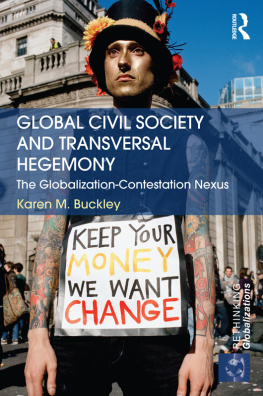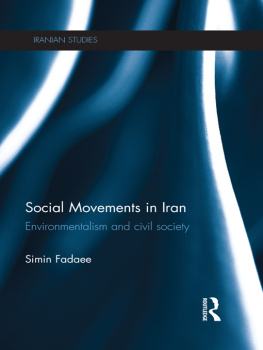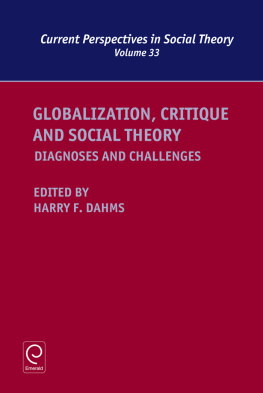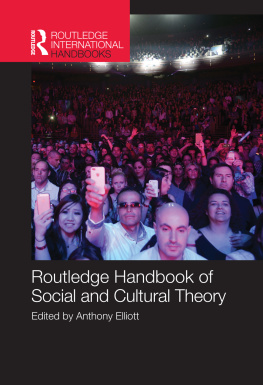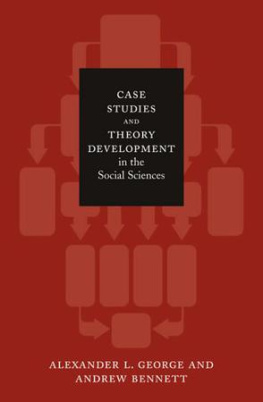Cultural Transformations and Globalization
Cultural Transformations and Globalization
Theory, Development, and Social Change
Alexander M. Ervin
First published 2015 by Paradigm Publishers
Published 2016 by Routledge
2 Park Square, Milton Park, Abingdon, Oxon OX14 4RN
711 Third Avenue, New York, NY 10017, USA
Routledge is an imprint of the Taylor & Francis Group, an informa business
Copyright 2015, Taylor & Francis.
All rights reserved. No part of this book may be reprinted or reproduced or utilised in any form or by any electronic, mechanical, or other means, now known or hereafter invented, including photocopying and recording, or in any information storage or retrieval system, without permission in writing from the publishers.
Notice:
Product or corporate names may be trademarks or registered trademarks, and are used only for identification and explanation without intent to infringe.
Library of Congress Cataloging-in-Publication Data
Ervin, Alexander M. (Alexander MacKay)
Cultural transformations and globalization : theory, development, and social change / Alexander M. Ervin.
pages cm.
Includes bibliographical references and index.
ISBN 978-1-61205-812-2 (pbk. : alk. paper)
ISBN 978-1-61205-901-3 (library ebook)
1. Social evolution. 2. Cultural diffusion. 3. Culture and globalization. I. Title.
GN360.E79 2014
303.4dc23
2014026942
Designed and Typeset by Straight Creek Bookmakers.
ISBN 13: 978-1-61205-812-2 (pbk)
ISBN 13: 978-1-61205-811-5 (hbk)
Contents
Appendices on the Web (www.routledge.com/9781612058122)
A. The Grand Tour: An Overview of Change Types
B. Innovation and Diffusion
C. Sustained Cultural Contact (Acculturation)
D. Revitalization Movements and Crisis Cults
E. Neoevolutionism
F. Urbanization
G. Applied and Practicing Anthropology and Resources for Students
I wrote this book with the hope of reviving interest in social and cultural change as a more specifically considered domain. When I was a student at the Universities of Toronto and Illinois during the 1960s, that was the heyday of this kind of research. It was a stimulating time to be a graduate student. My masters and PhD research were framed by various components of change theory relevant to indigenous issues in the Canadian North and Alaska. I had the luck and privilege of working as a student researcher for Julian Steward (1955) in his attempt to rewrite his landmark Theory of Culture Change. Alas, he died before that came about. The best course I had at the University of Illinois was on cultural change and was actually taught by a graduate student, the late Niels Braroe, who was studying cultural change among the Plains Cree in the region where I now live. He taught the course in place of the senior professor who was frequently away on national commissions. Niels became my mentor, best friend, and later much-loved uncle to my children. It would have been a joy to have written this book with him. To both Niels and Julian Steward, I dedicate it.
After graduating, I continued local research on topics in Saskatchewan as related to social and cultural change as well as political ecology. These included studies and engaged advocacy campaigns about changing farming and rural community adaptations, the impacts of confined animal factory operations (hog barns), projected impacts of casino gambling on the city of Saskatoon, and the complicated transformations being brought about by the nuclear and uranium industries. It also included issues of the integration and adaptation of government sponsored refugees and needs assessment projects for a variety of urban human service agencies in Saskatoon. These projects overlapped in engagement with local policy research and making institutions. It has involved participation and engagement in social movements dedicated to either resisting or bringing about changes such as with Green Energy ProjectSaskatchewan that promotes the social, ecological, and economic advantages of renewable energy. The contributions of anthropology as applied locally have been my obsession.
Change rather than stasis has been at the center of all this work. For forty-three years now I have biannually taught a course on cultural change modeled after the prototype taught by Niels Braroe. During that time while trying to keep up with the literature, I noticed its abrupt fade after the 1980s. This may have been due to the over-two-decade self-critique that anthropology was putting itself through. That postmodernist thrust suggested that classical ethnography and theory were, in effect, fictions generated through pseudo-scientific models and tended to ignore the multiple voices of those often studied in neocolonial contexts. Furthermore, much of this classical anthropology had a tendency to essentialize and that promoted misconceptions of realities that were really more fuzzy or blurred than portrayed. Reality as portrayed through social science was fiercely contested by those who turned to more literary devices and the humanities to express themselves and represent the voices of marginalized others in an effort to decolonize anthropology.
While these trends were dominant, shaped by my training, I contented myself with the local activities mentioned above. Then by the 1990s, however, newer anthropological work on globalization caught my attention and I reshaped the cultural change course to include a very large dose of it. I, along with most, saw globalization as a process in continuity with developmenta sort of modernization on steroids. Interest in this topic coincided with further local engagement. My research, collaboration, and movement activities were linked with concerns about the dominance of neoliberalism and its impacts on the agricultural and energy sectors of my region of Canada.
Waking from a kind of Rip van Winklelike theoretical disengagement, I decided to see whether anything else relevant to change was being doneespecially the useful lessons of the period of collective self-reflection seemed to have been absorbed and people were moving on to other things. Yet when perusing more recent anthropological literature, I found that its staying power was often comparable to a hastily digested meal leaving one still hungry.
Relevant cautions noted, social science theories and concepts, grand or small, could be metaphorically considered as organized containers or scaffolding to make some coherence out of information so that broader lessons can be absorbed. Globalization, for instance, can be seen as both a concept and a set of theories and it helps us to organize a perception of recent events and their impacts. It can be refined from a notion of economic and political hegemony from the West oriented toward a common integrated world market for the production and exchange of commodities. We can elaborate its conditions, such as those beyond the purely political economic. We can contest or refine its theoretical manifestations and develop auxiliary concepts, such as glocalizationthe playing out of globalization trends in a uniquely local context. Whether or not the theories of globalization are ultimately culturally based projections of the Western mind matters little because they can always be further debated. More important, they help us understand global events, such as associated with the recession of 2008, the response of the Zapatistas in 1992, carnages of the recent wars in Iraq and Afghanistan, and the displacements of large numbers of people to mega-cities in the developing world. Similarly, such recent concepts as cascades, tipping points, and strange attractors, from recent and complexity/emergence theory, can be useful in understanding our ever-chaotic and dangerous world. So, theory, grand or otherwise, is good in my opinion.


